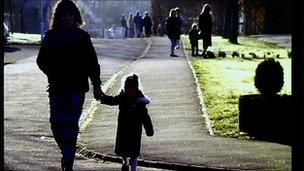'40,000 Northern Ireland children in severe poverty'
- Published

Poverty affects children's social and educational development
One in 10 children in Northern Ireland, or about 40,000, are living in severe poverty, according to research commissioned by Save the Children.
Head of Save the Children in Northern Ireland Fergus Cooper said that number would rise in 2011.
He said cuts in the executive's spending would begin to take effect and result in job losses.
He suggested that unless the government takes urgent action many more children will fall into severe poverty.
"Families are getting by on less than £7,000 a year for a lone parent with one child and less than £12,500 for a couple with two children," he said.
"This means children are going to sleep at night in homes with no heating, without eating a proper cooked meal and without proper school uniforms to put on in the morning."
Mr Cooper said it was "scandalous that in the 6th largest economy in the world children were growing up in severe poverty".
He said such children were also missing out on things like school trips and hobbies, which would affect their social and educational development leaving many excluded from society.
'Unacceptably high'
The Northern Ireland figures are part of a UK-wide report, Severe Child Poverty: An Update, commissioned by Save the Children from the New Policy Institute, which reveals that 1.6m children across the UK live in the deepest poverty, a figure the charity said is "unacceptably high".
The report also revealed that in Northern Ireland there is a higher likelihood of severe poverty among children in households where no-one is employed. About 29% of children in workless families are affected by severe poverty compared to around 4% of children in families where at least one parent works.
The figures also show that the risk is far higher among children living in lone parent households. And they indicate that the problem is worse in western counties with severe child poverty standing at 12%, compared to 7% in the east and a level of 5% in Belfast.
Mr Cooper said he welcomed the NI Executive's recent decision to measure severe poverty.
"We strongly recommend that the Executive urgently creates a vigorous, co-ordinated strategy to tackle the problem," he said.
"As most children living in severe poverty are in workless households the Chancellor must make sure that new jobs are channelled into the poorest areas."
Mr Cooper also called for more support for low income parents who wish to work part-time, with childcare costs and training opportunities for parents who need to boost their skills.